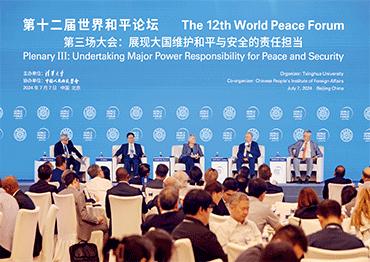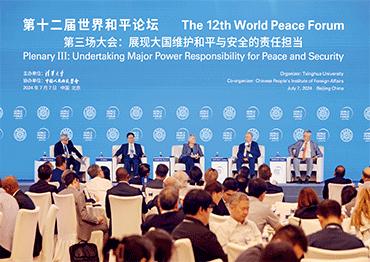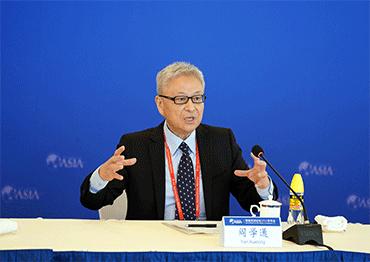n July 6, the 12th World Peace Forum, co-organized by Tsinghua University and the Chinese People’s Institute of Foreign Affairs, opened in Beijing. Themed “Improving Global Security Governance: Justice, Unity, and Cooperation,” the forum drew more than 400 attendees from around the world, including former foreign leaders, senior diplomats, experts and scholars.
Founded in 2012, the forum is an annual non-governmental forum on international security issues. During the opening ceremony of this year’s forum, Chinese Vice President Han Zheng delivered a keynote speech, urging countries to work together to enhance global security governance, safeguard fairness and justice, and promote international security cooperation.
Noting that the world is undergoing profound changes unseen in a century, Han said that China loves peace and has always been a builder of world peace, is a contributor to global development and a defender of the international order. Stressing that China will always stay on the right course in a changing world, Han put forward three proposals: adhering to peaceful coexistence, advocating common security and promoting openness and inclusiveness.
NewsChina interviewed Yan Xuetong, a professor and director of the Institute of International Studies with Beijing-based Tsinghua University and chief editor of the Chinese Journal of International Politics, who chaired the forum. During a panel session held on July 7, Yan warned that amid the intensifying humanitarian crisis in Gaza, the world should be on alert toward the rising trend of counter-globalization which is spreading from the economic to the political sphere.
NewsChina: In recent years, there have been heated discussions on anti-globalization, de-globalization and counter-globalization. You have said that the West has been withdrawing its support for free markets and universal human rights, reflected by its policy of “decoupling” that disrupts global supply chains, and by the humanitarian crisis in Gaza. How should we understand the severity of such a trend?
Yan Xuetong: We need to distinguish between the concepts of anti-globalization, de-globalization and counter-globalization. Anti-globalization is a social movement based on the idea that globalization exacerbates social inequality and polarization, making the rich richer and not benefiting the poor. The iconic movement for anti-globalization was Occupy Wall Street. This movement was evidently unsuccessful, as it was a popular movement without the backing of political power.
De-globalization refers to government policies by which a state uses its sovereign power to reduce international trade and cooperation. Counter-globalization refers to a broader trend to reverse economic marketization and political democratization in the post-Cold War era.
The trend of counter-globalization, in particular, is getting more severe. Starting from around 2018, counter-globalization has primarily taken place in economic fields, manifested as a decoupling agenda and trade protectionism. This has resulted in the problem that effective distribution of economic resources globally is difficult.
However, counter-globalization has become more evident in the political sphere since this round of the Gaza crisis that started in October 2023. Israel’s occupation of Palestinian territories and oppression of the Palestinian people has been a long-standing issue, but deprivation of human rights of civilians at such a huge scale over such a short period has never been seen before.
For example, international laws clearly stipulate that forced relocation or expulsion of civilians from conflict zones is prohibited, but the Israeli military has openly ordered the over 1.5 million residents in Gaza to leave their homes. Such large-scale violations of basic human rights were very rare in the post-Cold War era.
It is important to note that the political democratization of the post-Cold War era at the international level primarily manifests in the emphasis on human rights. Overall, the world has reached a consensus that there is more respect for human rights and humanitarian rules.
But with the war in Gaza, it appears that the most basic humanitarian rules are no longer respected or enforced. And it is Western governments, though not all of them, not governments of developing countries, that refuse to prioritize the protection of basic human rights of civilians in Gaza and turn a blind eye to the Israeli government’s breaches of international law and human rights.
NC: As you mentioned, some Western countries, particularly some in Europe, have voiced opposition toward the actions of the Israeli government. In this context, will the counter-globalization trend be curbed by the strong international reaction to the Gaza crisis, or will it continue to intensify?
YX: Governments within Europe have taken different stances on the Gaza issue. For example, Ireland, Belgium and Spain opposed Israel’s human rights violations from the beginning. Other countries, like the UK, have continuously exported weapons to Israel, and both the UK and Germany have only recently begun adjusting their policies of supporting the Israeli government.
Globally, the majority of the rest of the world, either in terms of the number of countries or the population, opposes Israel’s actions, including over 50 Islamic countries and the Muslim population accounting for approximately one-quarter of the world’s total. However, the majority is not strong enough to stop these enormous human rights violations, as no country has the ability to stop the US government from providing military equipment to Israel. The US government has shown that it has no political will to stop Israel’s military actions or to reverse the counter-globalization trend either.
NC: Do you think that the intensifying competition between major powers has made it so hard to curb the trend of counter-globalization?
YX: It can be argued both ways – that major power competition has intensified the counter-globalization trend, or that the regression of globalization has exacerbated the competition among major powers. I believe that major power competition is merely a phenomenon resulting from counter-globalization. A more fundamental reason behind counter-globalization is the transformation of values in the West. Populism has overshadowed liberalism in Western societies and Western governments have adopted economic protectionism and political isolationism, while abandoning globalization policies underpinned by liberalism.
New values are embraced where there is wide dissatisfaction toward living conditions and social situations, and populist values offer explanations that are perceived as correct by the public. For example, many people in the West attribute social conflicts and economic problems in their countries to external factors, which has led to rising xenophobia. As populism advocates reducing interactions with external societies, protecting domestic markets and cutting off external influences, many people consider it a viable solution.
NC: There has been what many call a resurgence of the left in elections in some European countries, such as the UK and France. Some say that when people find that right-wing protectionist policies fail to improve their lives, they will return to rationality. Do you agree with this assessment?
YX: I do not think this will be the case for certain. It is hard to predict where public attitudes in European societies will turn to. They could turn to other political ideologies or other right-wing thoughts, not necessarily back to liberalism. What is clear is that many Europeans believe that previous liberal policies were wrong and must be abandoned. Therefore, regardless of whether new policies will be effective, no one wants to talk about liberal doctrines anymore.
NC: As counter-globalization becomes a long-term trend, many analysts argue that the world has returned to a Cold War state. Do you agree?
YX: I don’t think it is appropriate to compare the current development with historical events, just as we cannot compare World War II with the Spring and Autumn period or the Warring States period in ancient China.
If we focus on the modern history of the world, there is a clear distinction between international politics in the digital age and in the pre-digital age. One significant difference is that in the digital age, the core of international competition lies in technological innovation.
Historically speaking, the pursuit of power has always been the fundamental force behind major power competition. But what they fought for to win the competition varied in different eras. In the agricultural era, they struggled to occupy more land. In the era of maritime expansion, they focused on controlling more seas, ports and shipping routes. During the Cold War, the motive was to expand their ideological influence.
I believe that in the digital age, the key to major power competition has shifted to the battle for standard-setting power, meaning the competition over whose technical standards can become the international norm. This is precisely the goal of the US’s efforts to establish a “6G Alliance.”
NC: If that is the case, can we say that the risk of a global war triggered by the new round of major power competition and counter-globalization is relatively small? How can countries realize the importance of cooperation in tackling common threats faced by humanity?
YX: It is quite unlikely that current major power competition will trigger a world war, primarily due to the existence of nuclear weapons. A nuclear war could annihilate all humanity, making such a war meaningless and with no winner. Therefore, as long as nuclear weapons continue to serve their political function, there is a high likelihood of avoiding a world war.
The possibility of international cooperation on global issues depends on the perceived severity of threats. For example, the Covid-19 pandemic posed a common threat to all humanity, but cooperation on global public health faced serious obstacles among major powers because some countries did not consider Covid-19 as an existential threat to humanity. On the other hand, major countries are currently cooperating on global governance on AI as they are all concerned that humanity might face the risk of extinction if AI is allowed to rule the world.
Therefore, when a global issue only poses threats to a section of humanity but does not pose an existential threat of all humans, it will not provide sufficient momentum to promote cooperation between major powers. It has to be something that could lead to the extinction of human beings.
NC: How has the Russia-Ukraine conflict influenced the trend of counter-globalization?
YX: The Russia-Ukraine conflict has accelerated the trend of counter-globalization. One of the results is that the concept of “economic security” has taken root among European countries. Because of the breakdown of energy supply from Russia after the Russia-Ukraine conflict, there is a fundamental change in the security mindset of many European countries. With rising concerns over its supply chains, European countries adopted a so-called derisking agenda, which has ironically led to more supply chain disruption and further fueled the counter-globalization trend.
No European state will emerge stronger through this conflict. For all the involved parties in Europe, the growth of their absolute power has significantly slowed.
NC: Will Europe ever reach a consensus on the security order of the continent?
YX: Both sides of the war undoubtedly hope for the other’s failure. But the war has lasted for more than two years, showing that neither side has the ability to prevail in the short term. If they had that ability, this goal would have been achieved long ago.
At the World Peace Forum, many participants from Europe stated that Europe cannot maintain its own security. I think it is important to emphasize the reality that Europe has not been able to maintain its security order since the end of the Cold War, not just from the Russia-Ukraine conflict.
Europe has experienced a series of conflicts in the post-Cold War era, including the Kosovo War, the Russia-Georgia War and the two Nagorno-Karabakh wars between Armenia and Azerbaijan. As a regional organization, the EU is not as strong in maintaining its own peace as ASEAN is.
NC: During the World Peace Forum, you frequently mentioned that now is the time for Europe to learn from Asia about managing security risks. What can the EU learn from ASEAN?
YX: The question is not whether ASEAN can handle conflicts better than the EU, but why there have been no wars between the world’s major countries in Southeast Asia since the end of the Cold War. No region can avoid military conflicts forever, but Southeast Asia has maintained a largely peaceful environment for a long time, and it is something Europe can envy.
It is quite a big topic to explain why ASEAN can maintain regional peace. But one thing is for sure. Regional peace is more likely to be secured if the principle of “peaceful coexistence” is upheld, because its de-escalation efforts have prevented disputes from developing into conflicts and prevented conflicts escalating into wars.
As major power competition is set to intensify, there will be more opportunities for forces like ASEAN to adopt neutral and flexible diplomatic and security strategies.
The more intense the major power competition, the greater the political space for “middle powers” to maneuver. As major powers increasingly need their support, the middle powers will have more bargaining power against major powers and take more prominent roles in global affairs.

 Old Version
Old Version

